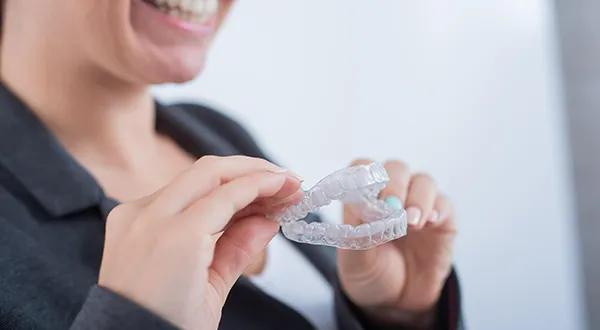Conditions treated by clear aligners
Dr. Hoss Abar
In this blog post, we'll discuss the various conditions that can be treated by clear aligners, including mild to moderate cases of crowded or spaced teeth, overbite, underbite, and crossbite. By the end of this article, you'll better understand whether clear aligners are a suitable option for your orthodontic needs.
Conditions Addressed by Clear Aligners
Orthodontic conditions encompass a range of issues related to the misalignment of teeth and jaws. Clear aligners have emerged as a versatile solution for correcting these conditions, offering a more discreet and patient-friendly alternative to traditional braces. Here, we delve into the specific orthodontic conditions that clear aligners can effectively address:
- Overbite:
Upper front teeth excessively overlap lower front teeth.
- Underbite:
Underbite happens when the lower front teeth protrude beyond the upper front teeth. Clear aligners work to correct the alignment of the lower and upper teeth, gradually improving the underbite.
- Crossbite:
Teeth are misaligned horizontally, with some upper teeth sitting inside the lower teeth.
- Open Bite:
An open bite is characterized by a lack of vertical overlap between the front teeth of both jaws when the mouth is closed. Clear aligners aim to close the open bite by guiding the teeth into proper alignment.
- Crowded Teeth:
This occurs when the jaw has insufficient space for all the teeth to align correctly. Clear aligners gradually shift and align overcrowded teeth by creating space and guiding them into the desired position.
- Spacing Issues:
Spacing issues involve gaps or spaces between teeth, disrupting the natural alignment. Clear aligners can close gaps and spaces effectively, providing a harmonious and well-aligned smile.
- Overjet (Protruding Teeth):
Overjet refers to the horizontal projection of the upper front teeth beyond the lower front teeth. Clear aligners can help reduce overjet by gradually repositioning the upper front teeth.
Candidates for clear aligners
Clear aligners have become popular for orthodontic treatment due to their discreet nature and flexibility. However, only some are suitable candidates for clear aligner therapy, and certain limitations must be considered. Here, we explore the factors that determine the candidacy of clear aligners:

Candidacy Criteria
- Mild to Moderate Cases:
Clear aligners are typically best for patients with mild to moderate orthodontic issues, including crowding, spacing, overbites, underbites, crossbites, and open bites.
- Adults and Adolescents:
Both adults and adolescents may be candidates for clear aligner treatment, with specialized options available for younger patients.
- Dental Health:
Candidates should have good oral health, including healthy gums and teeth, as clear aligners require proper hygiene during treatment.
- Compliance:
Successful treatment with clear aligners depends on the patient's commitment to wearing them for the recommended hours each day and following the orthodontist's instructions accurately.
- Removability Considerations:
Clear aligners must be worn for 20-22 hours daily. Candidates should be responsible enough to comply with this requirement and refrain from frequently removing the aligners.
- Adult Dentition:
Clear aligners are generally more effective for individuals with fully developed adult dentition. They may not be suitable for young children with primary teeth.
It is essential for individuals considering clear aligner treatment to undergo a thorough assessment by an orthodontic professional. The orthodontist will evaluate the specific orthodontic issues, overall oral health, and individual characteristics to determine whether clear aligners suitably. While clear aligners offer numerous benefits, understanding their limitations and candidacy criteria is crucial for making informed decisions about orthodontic care.
Maintenance and Aftercare
Completing the active phase of clear aligner treatment marks an exciting milestone, but proper maintenance and aftercare are essential to ensure lasting results. Here's a guide to the maintenance and aftercare aspects of clear aligner orthodontic treatment:
- Post-Treatment Retention:
Orthodontists often recommend using retainers to maintain the newly achieved tooth alignment after the active phase of clear aligner treatment.
- Types of Retainers:
Retainers can be removable or fixed. Clear retainers are a common choice for those who prefer a discreet option.

- Monitoring Progress:
Regular follow-up appointments with the orthodontist are crucial to monitor the stability of the results and address any concerns.
- Adjustments if Necessary:
Some adjustments may be needed to fine-tune the alignment or address minor shifts.
- Maintaining Good Oral Health:
Continuing good oral hygiene practices is essential. Regular brushing, flossing, and dental check-ups help prevent issues such as cavities and gum disease.
- Cleaning Retainers:
If using removable retainers, cleaning them as per the orthodontist's instructions helps prevent bacteria buildup.
- Avoiding Certain Foods:
During active treatment, patients may have been advised to avoid certain foods that could damage the aligners. After treatment, it's essential to continue being mindful of food choices to prevent any issues with retainers or relapse.
- Consistent Wear:
Following the orthodontist's instructions on retainer wear is crucial for maintaining the achieved alignment. This may include wearing retainers full-time initially and then transitioning to night-time wear.
- Long-Term Monitoring:
Even after the active phase of treatment, orthodontists may recommend periodic check-ups to ensure that the teeth remain stable over the long term.
- Addressing Concerns:
Patients should promptly address concerns, such as discomfort or unexpected changes, by consulting with their orthodontist.
- Emergency Situations:
Patients should promptly contact their orthodontist for guidance in case of a broken or lost retainer or any other orthodontic emergency.
By following these maintenance and aftercare practices, individuals can enjoy the long-term benefits of clear aligner treatment and maintain a healthy, well-aligned smile. Regular communication with the orthodontic team ensures that any issues can be addressed promptly, contributing to the overall success and satisfaction of the orthodontic journey.
Contact your Pinole dentist, Dr. Hoss Abar, DDS, MSD at Abar Orthodontics, to learn more about conditions treated with Clear Aligners.
Resource:
*This media/content or any other on this website does not prescribe, recommend, or prevent any treatment or procedure. Therefore, we highly suggest that you get the advice of a qualified dentist or other medical practitioners regarding your specific dental condition.
More To Explore
About Us
We believe that every patient deserves to feel confident about their smile. Years of experience creating beautiful and flawless smiles.
Opening Hours:
Monday - Thursday: 8:00 AM - 5:00 PM
Friday: 8:00 AM - 12:00 PM
Saturday - Sunday: Closed
Abar Orthodontics, Pinole, CA
1500 Tara Hills Drive., Suite 204
Pinole, CA 94564
Abar Orthodontics, San Leandro, CA
145 East 14th street., #100
San Leandro, CA 94577
© 2026Abar Orthodontics | All rights reserved | Powered by:Vigorant, Inc.
